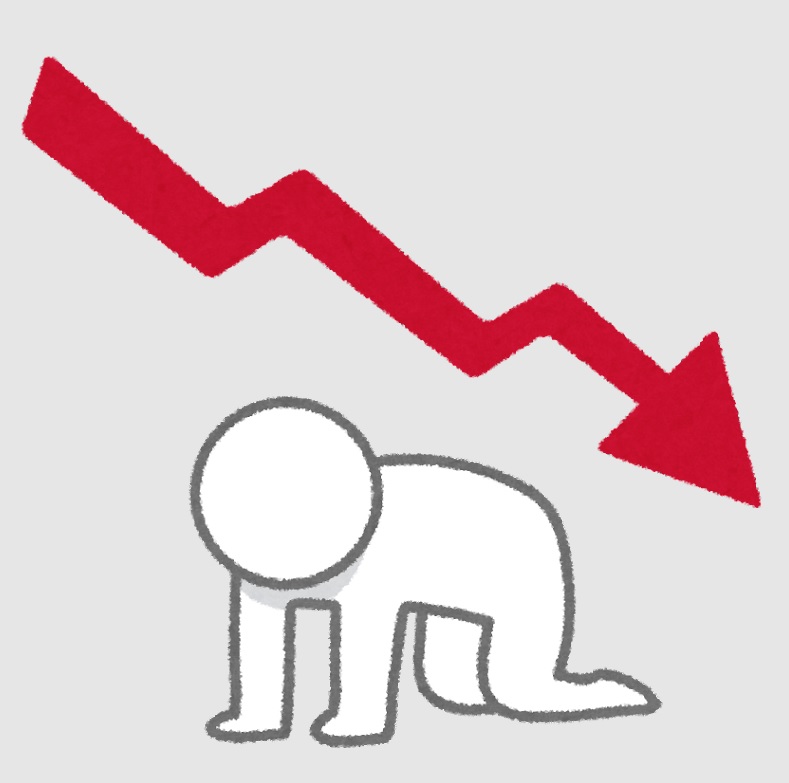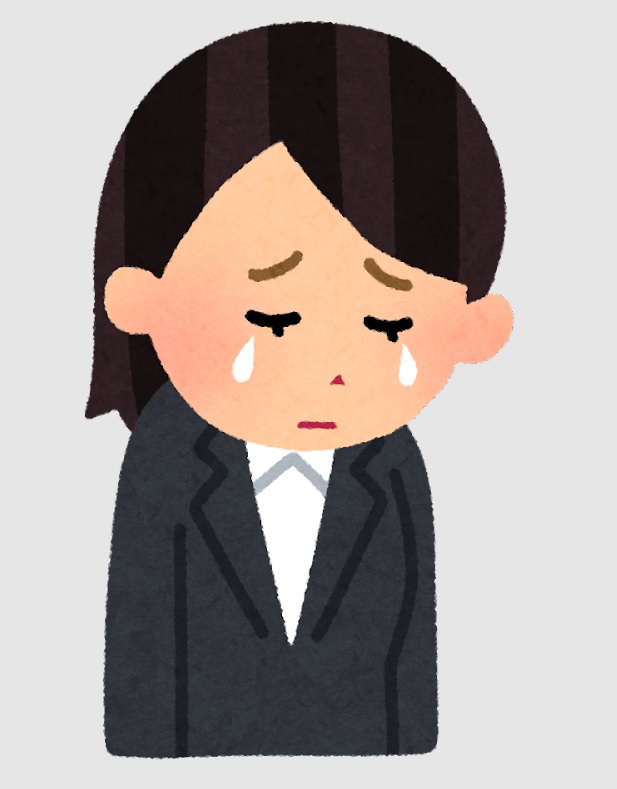「毎年お金がドンドン減る|不動産投資の落とし穴:ワンルームマンション投資の裏側を暴露!」
~前回のつづき~
●失敗する理由(つづき)
物件価格の値下がりを考えられていない。
2118万円で買っても
毎年毎年価格というのは
下がっていく訳です。
30年前に買った価格と全く一緒で
築40年のボロボロになった物件が
全く同じ価格で売れるなんて考えにくい。
という事は
物件価格が毎年下がっていくんだから
この値下がりというのも
考慮しないといけないんですよ。
物件価格の値下がりを
30年で80%下がるというのを想定して
それを年割してザックリ入れてみました。
そうすると
年間40万円ずつぐらいは
価値が下がっていってる。
それから考えていくと
毎年お金がドンドン減るんですよ。
意味わかりますか?
実際には
物件の価格が下がっていってるだけなので
手残りとしては少し残るかもしれないですけれども
物件の価格の低下というのを考えると
実際毎年これだけ損をしていってる。
プラスキャッシュで買った場合を
計算しなかったんですけど
ややこしくなってくるかなと思って。
これを銀行から
大体借り入れする訳ですよ。
フルローンといって2118万円。
そうすると2118万円借りると
毎月毎月の返済があるわけです。
それを実際計算してみました。
家賃収入で払えるどころか
足りない分を給料から
補填していかないといけなくなります。
今後
キャッシュ・フローの計算というのも
お話ししていきます。
実際には資産になるどころか
30年間毎年毎年ずっと
お金を給料から補填して
払い続けていかないといけない。
そういう状況になってしまいます。
なので要はちょっと
数字が並んで見にくいかもしれませんが
全額キャッシュで
30年間満室で物件価格も下がらず
家賃も下がらず修理も一切無い状態で
やっと4万円残る。
そんな訳ないでしょ。
こんな話ないでしょ。
それで家賃が10%下がって
空室が10%出るだけで
実質毎年持ち出し
=給料から支払いしていかないといけない。
さらに銀行から借りれると
金利が2%ぐらいで計算すると
2118万円借りた状態で
30年間支払い総額2800万円ですよ。
なので現金一括で買った場合でも
負債を買う事になります。
本当は2118万円の価値のないものを
2500万円だったり
もっと高い値段で買わされている。
そういう事です。
1000万円の価値しか無いものを
買わされている。
銀行から借り入れした場合は
毎月毎月の支払いのお金が
大体すごく厳しくなります。
ザックリそういうものかなと
とりあえず
覚えてもらえればよろしいかと思います。
「節税になるんじゃないの?」
ならないです。
税金が減るのは赤字だから減るんですよね。
100万円毎年ドブに捨てて10万円帰ってくる。
そんな話です。
意味が無いですよね?
「年金の代わりになるんじゃないの?」
なりません。
マイナスのお金を払い続けて
30年ですよ。
築30〜40年のボロ部屋を
1室手に入れて資産になるか?
年金の代わりにならないですよね?
普通に貯金をつづけてた方が
お金は残ります。
毎年毎年ずっと
お金を払い続けていかなければならない。
毎年50万円赤字=持ち出しが出たとしたら
30年間で1500万円貯まるから
貯金した方がいいよという話です。
「保険の代わりになるんじゃないの?」
なりません。
保険に入った方がいいです。
掛け捨ての生命保険に入った方が
月の金額も安いし
万が一の事があった時に
もらえる金額もこっちの方が大きいです。
「サブリース(家賃補償)は?」
かぼちゃの馬車とかも
同じ様に問題になってました。
実際には付いてない家賃補償
ついてたとしても
最初の2〜3年のみです。
だから7〜8万円で
家賃を補償しますと言ってても
ずっとではありません。
規約や約款(やっかん)に
極々小さく書いてあります。
「2年目以降とか入居付けが出来なくなった時は
家賃を下げます。
だから7万円では継続出来ません。」
↓
「来年は6万円にして下さい。」
↓
「再来年は5万円にして下さい。」
と言われます。
それで
「そんな金額下げられたら無理です。」
「ああそうですか。
ではこの契約は継続出来ません。」
と言われて終わるだけです。
「自分でどうぞ入居者さん探して下さい」
と切られて終わりですね。
必ず書いてあります。
赤字がずっと出続けるのに
こんなの出来る訳ないじゃないですか。
「銀行からの信用毀損(きそん)になる?」
負債を買うのと同じです。
物件に担保能力がありません。
ワンルームマンションというのは
負債なので。
それだけの
価値がないものを買ってる
という事です。
だから物件に担保としての力を
見てもらえない。
どういう事かと言うと
物件を担保として見ている訳ではなく
あなたのサラリーマンとしての属性を
担保にしているだけなんです。
この物件からの支払いの能力ではなく
サラリーマンとしての所得を
担保にしているだけなんです。
だから住宅ローンを組んだりとか
今後不動産融資で物件をもっと
増やしていきたいという時に必ず響いてきます。
要は物件を増やせなくなる。
これパッとイメージ湧かないかもしれませんが
不動産投資の戦略において
銀行からの信用というのはすごく大事なので
ここを減らしてはいけません。
~~~つづく~~~
Special Thanks college president Ryo.
●おまけ
≪≪Chat-GPTくんによる要約→perplexityちゃんによる文章まとめ≫≫
この文章は、ワンルームマンション投資のリスクと失敗の理由を詳述しています。まず、物件価格が毎年下がることを考慮せずに投資することが多く、30年間で80%も価値が減少する可能性があると指摘しています。このため、年間約40万円の価値低下を想定し、実際には家賃収入だけではローン返済が難しく、給料からの補填が必要になることが多いです。
理想的な条件でも利益はわずかで、現実には赤字になるケースが多いことが強調されています。また、銀行からのフルローンを組むと、返済総額が購入価格を大きく上回り、節税効果も赤字のために限られています。さらに、年金や保険の代わりにはならず、普通に貯金を続けた方が有利です。サブリースの家賃保証も長期的には信頼できず、銀行からの信用を損なうリスクもあるため、慎重な判断が求められます。
Citations:
[1] https://t23m-navi.jp/magazine/news/2025_daibouraku/
[2] https://ieul.jp/column/articles/48201/
[3] https://www.reds.co.jp/real/p70423/
[4] https://librus.co.jp/jigyou_shokei/new/money/1953
[5] https://gk-cons.co.jp/column/condo-market-crash/
≪≪Chat-GPTくんによる英訳≫≫
~Continuation from Last Time~
【 Reasons for Failure (continued)】
Not considering the decrease in property value.
Even if you buy a property for 21.18 million yen, the price will decrease year by year.
It’s hard to believe that a 40-year-old worn-out property would sell for the same price as it was bought 30 years ago.
This means that since property values decline every year, you need to factor this depreciation into your calculations.
I assumed that the property value would decrease by 80% over 30 years and roughly broke it down into yearly figures.
As a result, the value decreases by about 400,000 yen per year.
Considering this, your money decreases year by year.
Do you understand what I mean?
In reality, the value of the property is just decreasing, so you might be left with a little profit, but when you consider the depreciation, you are actually losing this much each year.
I didn’t calculate the scenario where the property is bought with full cash, but I thought it might get complicated.
You usually borrow money from a bank for this.
It’s called a full loan, and in this case, 21.18 million yen.
If you borrow 21.18 million yen, you will have monthly repayments.
I actually calculated this.
Not only will the rent income not cover the repayments, but you will also have to supplement the shortfall with your salary.
In the future, I will also talk about calculating cash flow.
In reality, instead of becoming an asset, you will have to supplement the payments from your salary every year for 30 years straight.
That’s the situation you end up in.
So, although the numbers may be a bit overwhelming, let me explain:
If you pay in full cash, and for 30 years the property stays fully occupied, without any decline in property value, rent, or need for repairs, you would only be left with about 40,000 yen.
There’s no way that’s true. This kind of story doesn’t exist.
And if rent drops by 10% and vacancies increase by 10%, you will actually end up in the red each year—meaning you will have to pay out of your salary.
Additionally, if you borrow from the bank at a 2% interest rate, the total repayment amount for 30 years will be 28 million yen.
So even if you buy with cash, you are essentially buying a liability.
You are being sold something worth less than 21.18 million yen, possibly for 25 million yen or even higher.
In other words, you are being sold something that is worth only 10 million yen.
If you borrow from the bank, the monthly repayments become extremely tough.
That’s roughly how it works, so just keep that in mind for now.
“Doesn’t it reduce taxes?”
No, it doesn’t. The tax reduction is only because you’re in the red.
It’s like throwing away 1 million yen every year and getting back 100,000 yen. It’s pointless, right?
“Doesn’t it serve as a substitute for a pension?”
No, it doesn’t.
You’ll be paying negative money for 30 years.
Is a worn-out room in a 30-40 year-old building really going to become an asset?
It’s not going to replace your pension, is it?
If you simply keep saving, you will have more money left.
You’ll have to keep paying money year after year.
If you end up with a 500,000-yen deficit each year, you could save 15 million yen over 30 years, so saving is the better option.
“Isn’t it a substitute for insurance?”
No, it’s not. It’s better to get insurance.
Term life insurance is cheaper each month, and if something happens, the payout is larger.
“What about subleasing (rent guarantee)?”
The same problems occurred with companies like ‘Pumpkin Carriage.’
In reality, there’s no rent guarantee.
Even if there is, it’s only for the first 2-3 years.
So even if they say they’ll guarantee rent at 70,000-80,000 yen, it won’t last forever.
In the terms and conditions, it’s written in tiny print.
“If we can’t find tenants after the second year, we will lower the rent. So it won’t continue at 70,000 yen.”
→ “Please reduce it to 60,000 yen next year.”
→ “Please reduce it to 50,000 yen the year after that.”
And when you say,
“If you lower it that much, it’s impossible.”
They’ll respond,
“Oh, is that so? Then we cannot continue this contract.”
And that’s the end of it.
“You can go ahead and find tenants yourself.”
You’ll be cut off, and that’s it.
It’s always written in the contract.
It’s impossible to keep doing something like this when you’re continuously making a loss.
“Won’t it damage my credit with the bank?”
It’s the same as buying a liability. The property has no collateral value.
A studio apartment is a liability.
You’re buying something that has no value.
So the property won’t be seen as collateral.
What does this mean? It means that the bank is not seeing the property as collateral but rather your attributes as a salaried worker.
They are not relying on the income from the property but on your income as a salaried worker.
This will definitely affect you if you try to take out a mortgage or if you want to expand your real estate investments in the future.
In short, you won’t be able to acquire more properties.
This may not be immediately clear, but in real estate investment strategy, maintaining your credit with the bank is crucial, so you should avoid diminishing it.
Special Thanks OpenAI and Perplexity AI, Inc


